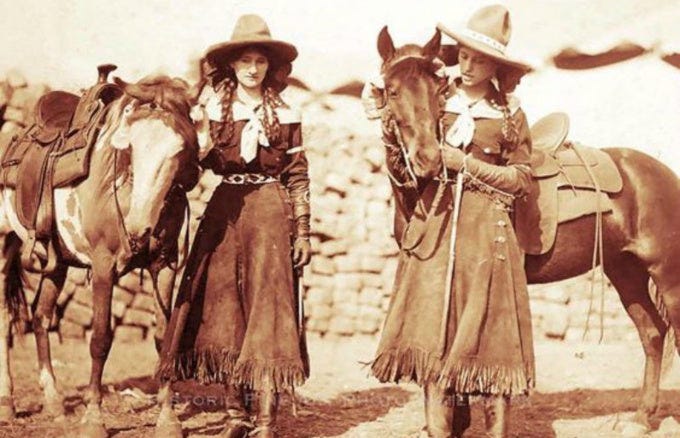Magenta Drift
And other names for dandy cowboys
Dear ones,
I haven’t posted anything substantial for a while. It’s been a time of big decisions, big changes. Of both welcome, and unwelcome, surprises. I’m writing, but so slowly. And thinking, but ooo so slowly. We’re moving house—with all that that entails, shedding and accruing and putting on a new skin. Finding who I am in a new community.
It’s all so goddam time-consuming!
And so, in lieu of something new, I thought I’d offer you something old (not borrowed, not blue).
This is a piece of writing from almost a decade ago. About films and poetry and grammar and cowboys. About the particular form of loss that I once wanted to adopt as my name (Magenta Drift), for drag or for dressing up as a cowboy.
Once upon a time I promised to tell you a story about the future.
At the film screening, a woman says that this film will never be shown again. It is showing signs of magenta drift. In the future, it will not be (though it will continue to exist). She is a soothsayer, a fortune teller. She makes prophecies in the dark.
[Through your words you touch the past, the way a child touches a wound. With tenderness and amazement. Not the way the past touches me during the day, like a bullet grazing across my skin. Not the way the past haunts me in the night, awake at 3am, alone with all that has happened.]
Over coffee I remind you that one day you will already have written these poems. We talk about tense, about modals and auxiliaries and infinitives. You are always already a poet. You will always have been writing.
[Last night, I dreamed you were remembering these poems that you have not yet written, were roping them back into yourself. You lassoed them out of the future, like a cowboy. I could hear that song in the background, and I knew–the way you know in dreams–that you had become a dandy cowboy1. That the poems were your cows. The livestock of your ephemeral fields.]
You are not finite, are not bounded by your body. You drift (magenta) in a future you cannot yet imagine. The future dreams of you and ties a knot, throws a loop, draws you close.
[When I was most sure that the future was not for me I would go through my diary, erasing my future self’s engagements with the world, working backwards through time to find the right day on which to die.]
You say you can’t imagine the future, and we talk about taking it one minute at a time. Buying groceries is an act of faith. When I have been most lost, I have not been able to believe in the future enough to buy food or wash clothes. Who would wear these things, I would wonder? Who would eat this food?
A friend tells me about her dog’s death. She loops a cardigan over her arm and imitates for me the moment when he will die. Her left hand is the vet. Death. Her right hand is the heart of her companion, pumping. Ba dum. Ba dum.
These days, I seem fated to believe in tomorrow. At 3am, I lie awake, alone with all that could happen2.
[The film that has no future is about bodies. (Bodies of light. Bodies of love.) The bodies in the film touch each other and smile. From their unimagined future, we watch them, knowing they are the ghosts. That their bodies, smooth flickers of gelatinous light, are older now. Have died and decayed and decomposed. Their ghosts are drifting towards us. But once upon a time, they took off their clothes and lay down in a field and smiled into each other’s eyes. But that was then, as the saying goes (I can hear the flickering of the film through the reels, across the burn of the camera’s eye), and this? This is now.]
One day, you will begin to show signs of drifting. You will drift. (You are drifting already.) You will become someone else; you will become yourself. This moment will be lost to you.
This story, this moment, will one day become [has become, now] our once upon a time.
This newsletter is still evolving. For now, my intention is to publish essays across a broad range of themes: life, love, writing, reading, the natural world, folklore, fairy tales, and so on. If you can afford to do so, I would be enormously grateful if you sponsored my writing by taking up a paid subscription.
If you have constructive feedback to offer, particularly in terms of things you’d like me to write about, or write more about, please let me know by posting in the comments. Also, if you have questions you’d like me to explore or even attempt—in my ever-ambling way—to answer, I’d love to hear them.
Thank you for reading!
‘The Dandy Cowboys’ is a 2012 song by Soko (Stéphanie Sokolinski).
‘alone with all that could happen’ is a line from William Gass’s short story ‘The Pedersen Kid’. Annie Proulx quotes this line in the introduction to the University of Chicago Press’s 25th anniversary edition of Norman Maclean’s A River Runs Through It (2001). Proulx writes of this quote: “This is the central pillar of the writer’s craft, to pull from the myriad of possibilities of all that could happen those that did and had to happen.” (p. xvi)




I relate to the groceries as an act of faith. I remember buying treats for my little dog when I knew deep inside he might never eat them. I still bought them. They were there for him. He was drifting on, but they were a little anchor for a time.